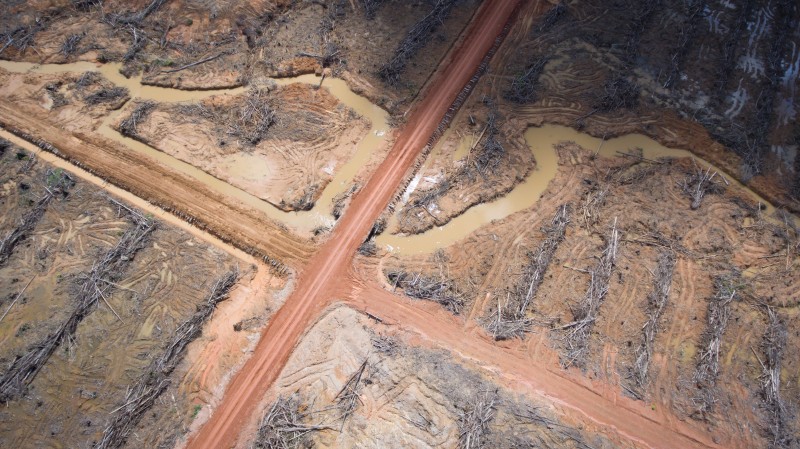The biggest palm oil company in Indonesia’s Papua province is systematically logging and burning a region of rainforest that is home to tree kangaroos, birds of paradise and cassowaries, a new investigation has revealed.
Using satellite imagery, drones and ground surveys a collaboration of NGOs calling itself Mighty uncovered the denuding of 11,700 hectares of pristine rainforest in the past three years in palm oil concessions operated by Korean company Korindo in Papua and North Maluku provinces. On top of the old-growth forest, 18,300 hectares of regrowth was stripped.
Bustar Maitar, who works in Papua for Mighty, was involved in the field expeditions that uncovered the devastation. Walking out of the living forest onto the bulldozed land ready for planting was “completely shocking and very sad”, he said.
“We see clear land. No timbers there. No green trees. No trees. No birds of paradise. There is no tree kangaroos. There is no life after they are clearing the forest,” he said.

Tree kangaroos are threatened by forest clearance (Pic: Flickr/Daniela Parra)
Papua carries 50% of Indonesia’s biodiversity. Many of its animals exist nowhere else on earth and the forests play home to the climbing marsupial tree kangaroos.
But amid all this life, palm oil is booming. Between 2005 and 2014 the number of operating plantations went from five to 21 – seven of them owned by Korindo.
This expansion is not only driving out wildlife; local communities are also having their land forcibly stripped away, according to the report.
Weekly briefing: Sign up for your essential climate politics update
Since 2013, hundreds of fires have been recorded in the concessions, peaking last year when nearly 500 blazes were caught by heat sensing satellites.
Palm oil companies are notorious for using fire to clear away forest debris and make land ready to plant their monocultures, despite this being against the law in Indonesia.
In 2015, the fumes from Indonesia’s annual burning season blanketed much of south east Asia in a deadly, choking smog. The World Bank estimates they cost the country US$16bn.
Fires in Korindo concessions made up 0.7% of all Indonesia’s burns that year, said Mighty’s report, an astonishing figure considering there are hundreds of palm oil and forestry companies working across the country.

PT Tunas Sawa Erma 1B concession, where 2,800 hectares of primary and secondary forest was cleared since 2015. Source: Mighty
Maitar said the debris left in concessions logged this year had been stacked and lined up, ready to be burned. The delayed dry season, which usually begins in June and brings the plantation fires, has now begun in earnest according to Greenpeace. On Wednesday the NGO reported 1,296 hotspots had appeared inside Indonesian oil, logging and mining concessions throughout August.
Until just this month, Korindo’s oil was being bought by some of the world’s biggest palm oil traders – Wilmar, Musim Mas, ADM, and IOI. They supplied it to consumers in Europe, North America, China and India, according to the report released by Mighty.
“Due to a lack of progress from the supplier, and in view of the serious allegations, Wilmar has ceased procuring from Korindo with effect from June 2016,” said a Wilmar spokeswoman.
Musim Mas has also stopped purchasing from Korindo but said it would continue a dialogue with the company. “We believe that transformation can only be achieved through positive engagement and result in real impact on the ground,” said a spokeswoman for the Singaporean company.

Deforestation in Korindo oil palm plantation, Papua (Pic: Mighty)
ADM and IOI bought their Korindo oil from Wilmar and Musim Mas. As such, Korindo has lost major business in the past season. The company did not respond to questions from Climate Home. Maitar said his organisation’s allegations had been similarly ignored by Korindo.
Clearing land in concessions is not always illegal in Indonesia. But it goes against the palm oil industry’s commitments to zero deforestation. Korindo is not a member of the Roundtable on Sustainable Palm Oil (RSPO) – the industry’s voluntary certification process – and has no published sustainability policy.
The allegations of delinquency against a former supplier of IOI are particularly jarring for the industry, which has been dealing with a shortage of sustainable palm oil since IOI had its license temporarily suspended, then reinstated by the RSPO earlier this year. Big buyers, including Unilever, Nestlé and Kellogg’s, continue to refuse to buy from the relicensed IOI – which is one of the largest suppliers in the world.
*Note: the article was amended to remove a reference to Musim Mas placing a moratorium on Korindo.
